Contents
| « Prev | DORE BIBLE GALLERY, COMPLETE | Next » |
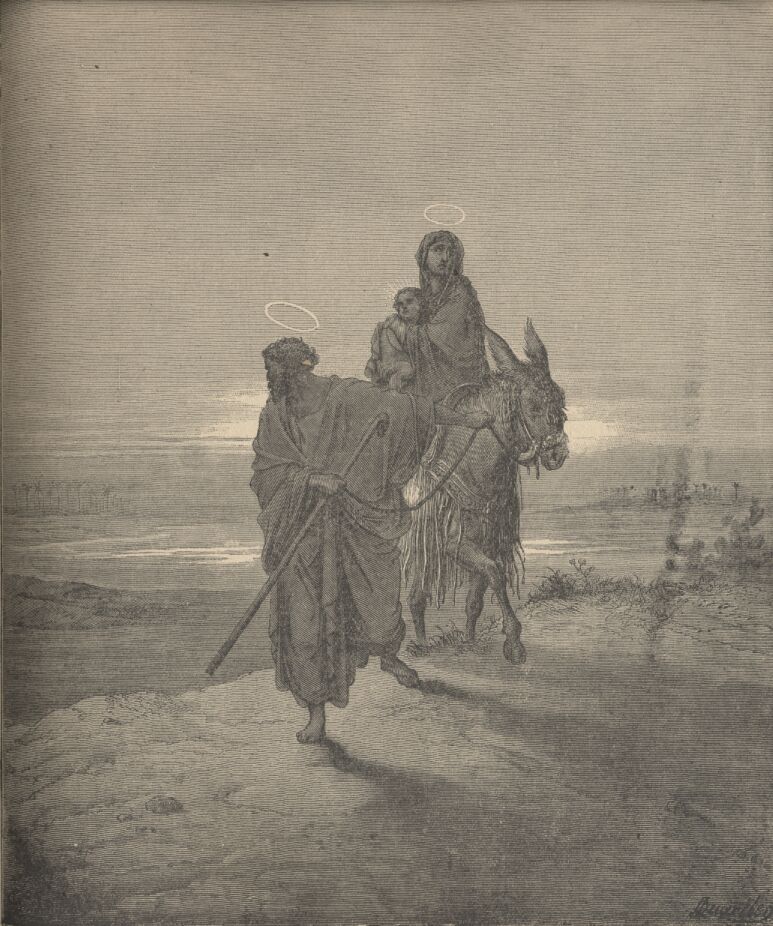
And when they were departed, behold, the angel of the Lord appeareth to Joseph in a dream, saying, Arise, and take the young child and his mother, and flee into Egypt, and be thou there until I bring thee word: for Herod will seek the young child to destroy him.
When he arose, he took the young child and his mother by night, and departed into Egypt: and was there until the death of Herod: that it might be fulfilled which was spoken of the Lord by the prophet, saying, Out of Egypt have I called my son.—Matthew ii, 13-15.
THE MASSACRE OF THE INNOCENTS.
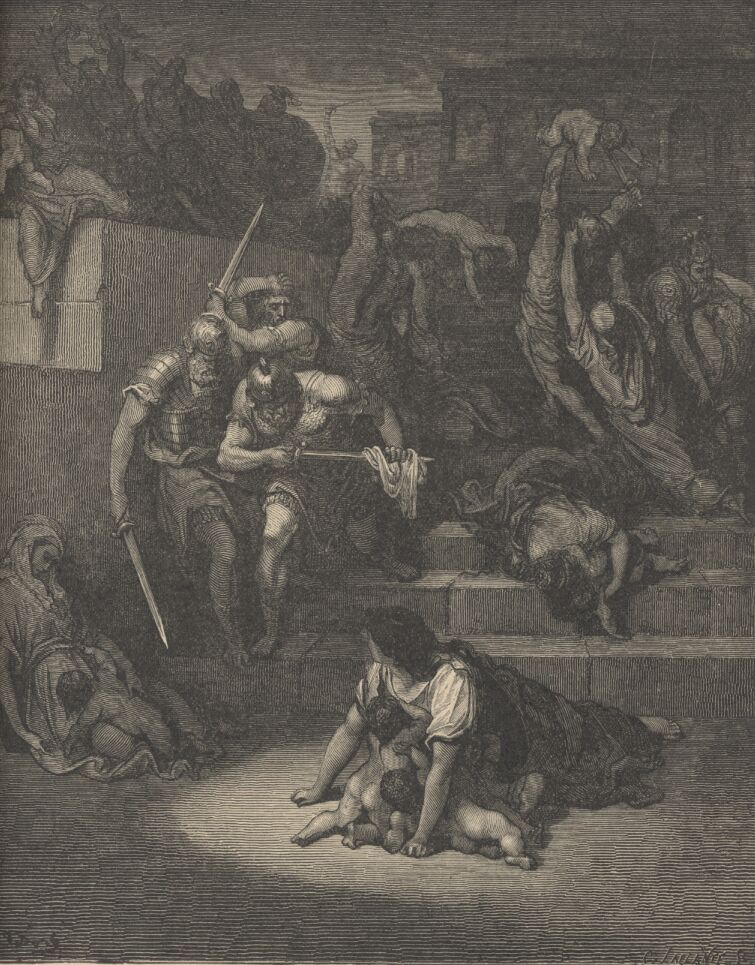
Then Herod, when he saw that he was mocked of the wise men, was exceeding wroth, and sent forth, and slew all the children that were in Bethlehem, and in all the coasts thereof, from two years old and under, according to the time which he had diligently enquired of the wise men.
Then was fulfilled that which was spoken by Jeremy the prophet, saying, In Rama was there a voice heard, lamentation, and weeping, and great mourning, Rachel weeping for her children, and would not be comforted, because they are not.—Matthew ii, 16-18.
JESUS QUESTIONING THE DOCTORS.
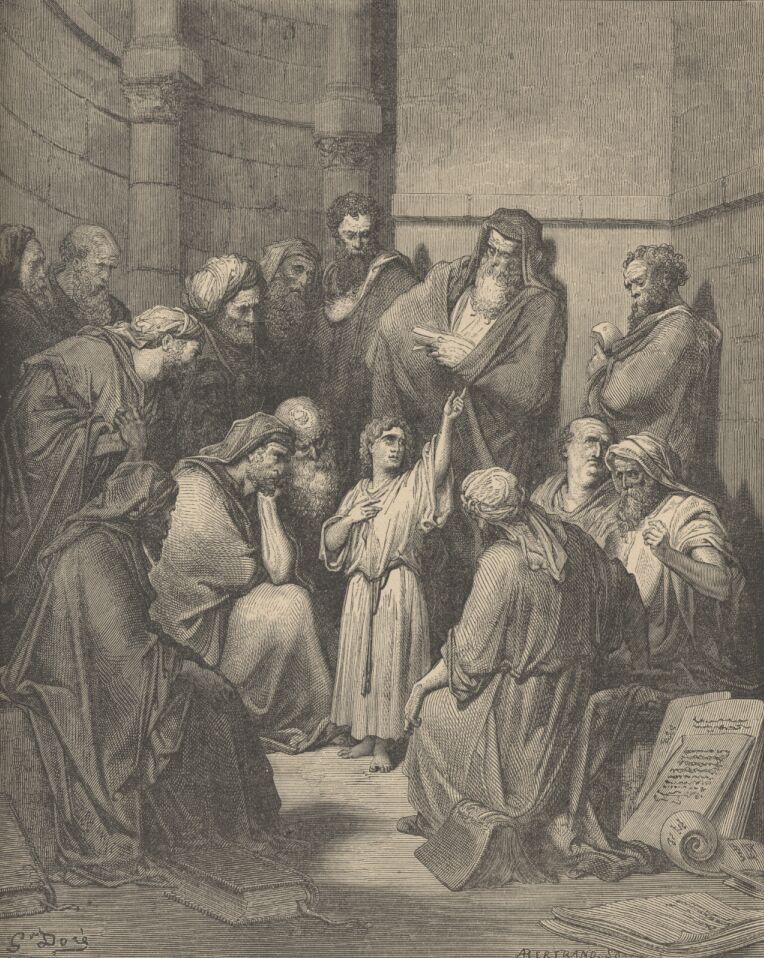
Now his parents went to Jerusalem every year at the feast of the passover.
And when he was twelve years old, they went up to Jerusalem after the custom of the feast. And when they had fulfilled the days, as they returned, the child Jesus tarried behind in Jerusalem; and Joseph and his mother, knew not of it. But they, supposing him to have been in the company, went a day's journey and they sought him among their kinsfolk and acquaintance. And when they found him not, they turned back again to Jerusalem, seeking him.
And it came to pass, that after three days they found him in the temple, sitting in the midst of the doctors, both hearing them, and asking them questions. And all that heard him were astonished at his understanding and answers.
And when they saw him, they were amazed: and his mother said unto him, Son, why hast thou thus dealt with us? behold, thy father and I have sought thee sorrowing. And he said unto them, How is it that, ye sought me? wist ye not that I must be about my father's business? And they understood not the saying which he spake unto them.
And he went down with them, and came to Nazareth, and was subject unto them but his mother kept all these sayings in her heart.
And Jesus increased in wisdom and stature, and in favor with God and man. Luke ii, 41-52.
JESUS HEALING THE SICK.
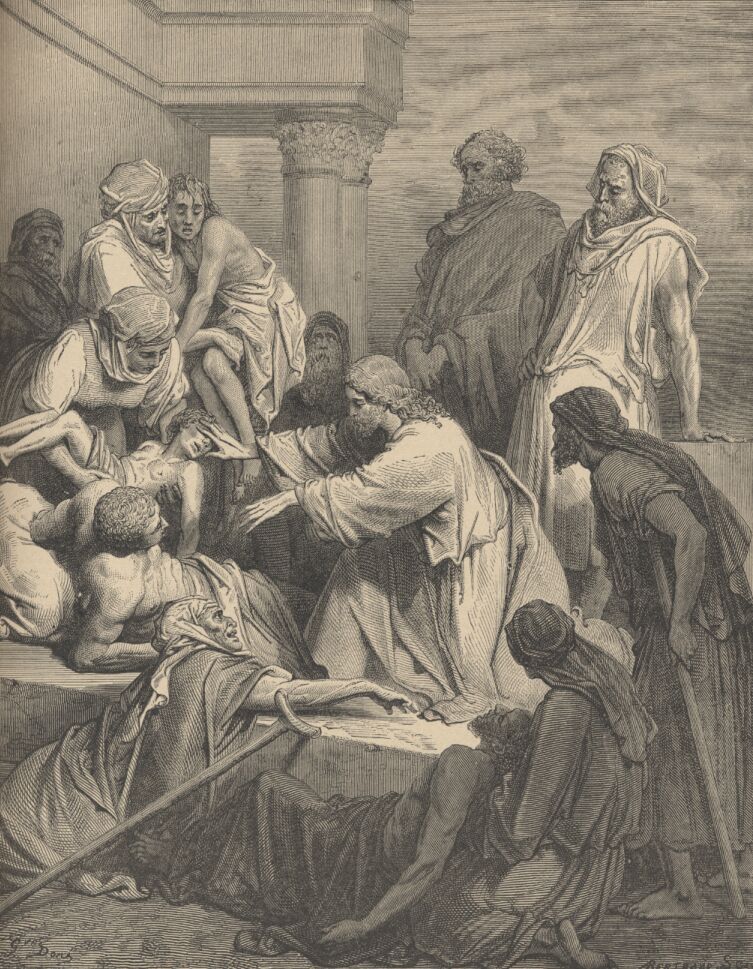
And Jesus went about all Galilee, teaching in their synagogues, and preaching the gospel of the kingdom, and healing all manner of sickness and all manner of disease among the people. And his fame went throughout all Syria: and they brought unto him all sick people that were taken with divers diseases and torments, and those which were possessed with devils, and those which were lunatic, and those that had the palsy;—and he healed them.—Matthew iv, 23-24.
SERMON ON THE MOUNT.
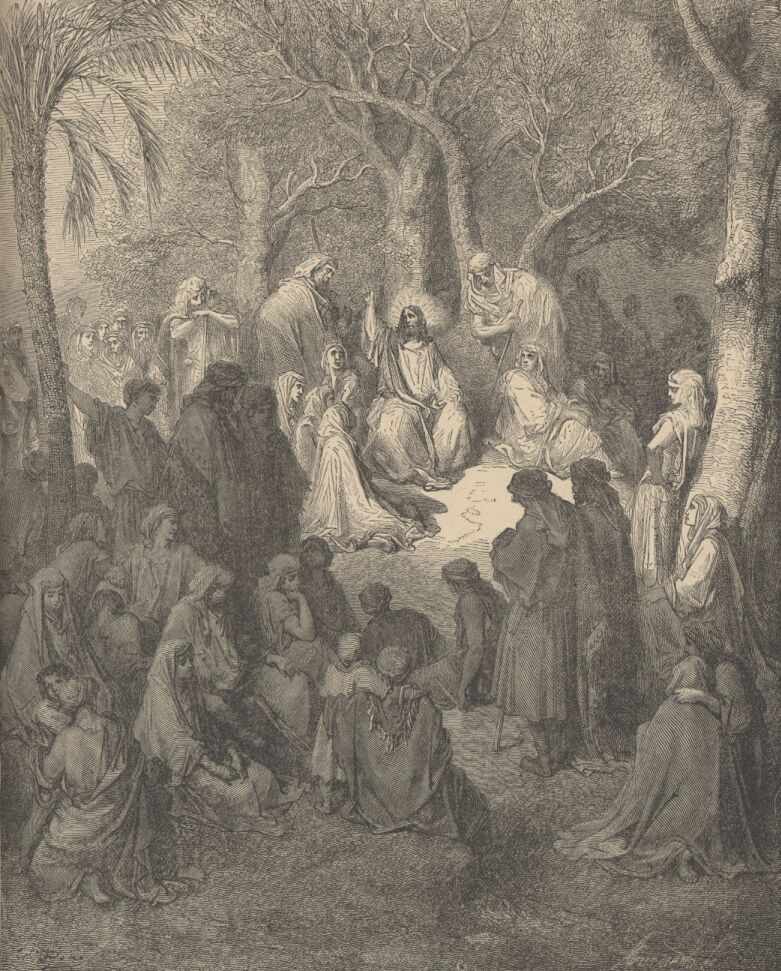
And there followed him great multitudes of people from Galilee, and from Decapolis and from Jerusalem, and from Judaea, and from beyond Jordan.
And seeing the multitudes, he went up into a mountain: and when he was set, his disciples came unto him. And he opened his mouth and taught them.
And it came to pass, when Jesus had ended these sayings, the people were astonished at his doctrine: For he taught them as one having authority, and not as the scribes.
When he was come down from the mountain, great multitudes followed him.—Matthew iv, 25; v, 1-2, 28-29; viii, 1.
CHRIST STILLING THE TEMPEST.
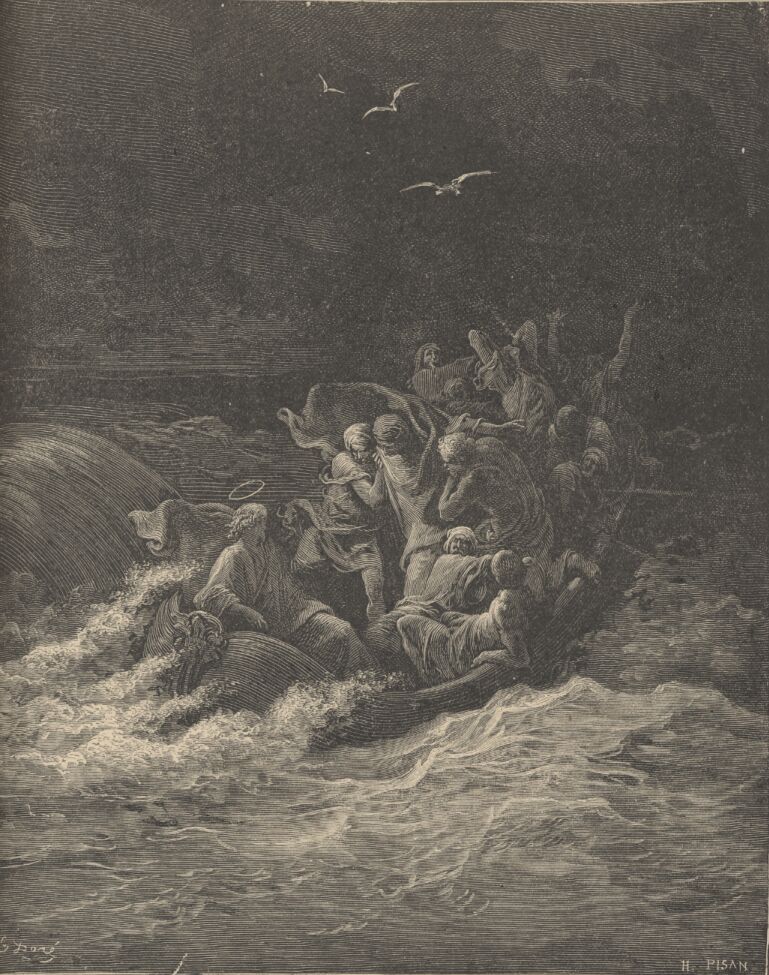
And when he was entered into a ship, his disciples followed him. And, behold, there arose a great tempest in the sea, insomuch that the ship was covered with the waves: but he was asleep. And his disciples came to him, and awoke him, saying, Lord, save us: we perish. And he saith unto them, Why are ye fearful, O ye of little faith? Then he arose, and rebuked the winds and the sea; and there was a great calm. But the men marveled, saying, What manner of man is this, that even the winds and the sea obey him?—Matthew viii, 23-27.
THE DUMB MAN POSSESSED.
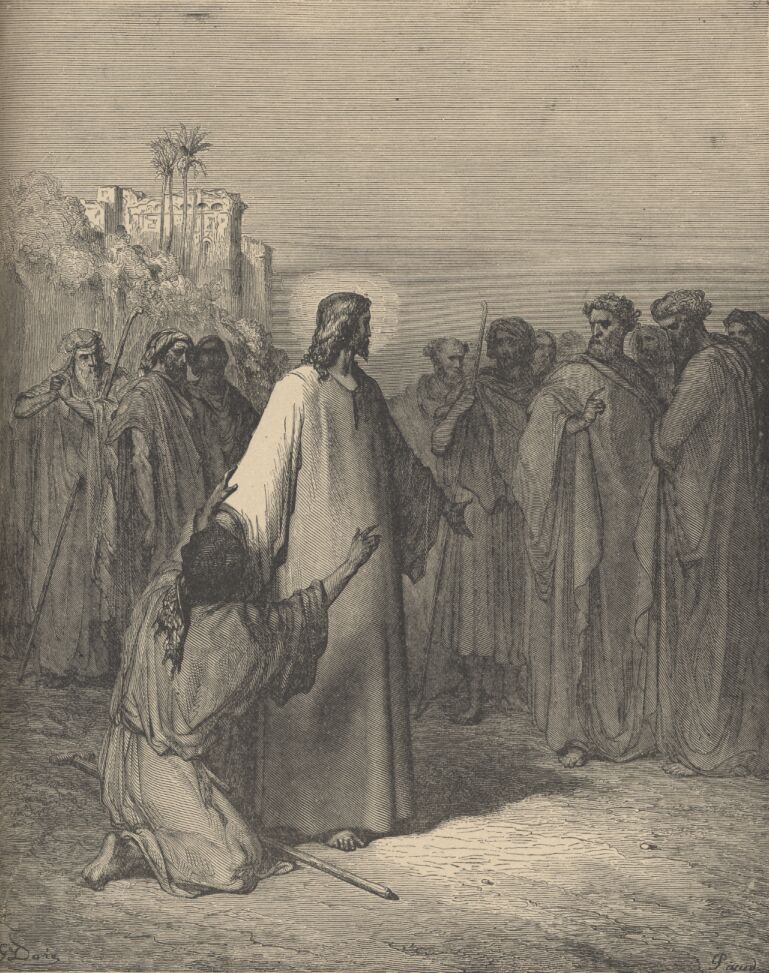
As they went out, behold, they brought to him a dumb man possessed with a devil. And when the devil was cast out, the dumb spake: and the multitudes marveled, saying, It was never so seen in Israel.
But the Pharisees said, He casteth out devils through the prince of the devils.—Matthew ix, 32-34.
CHRIST IN THE SYNAGOGUE.
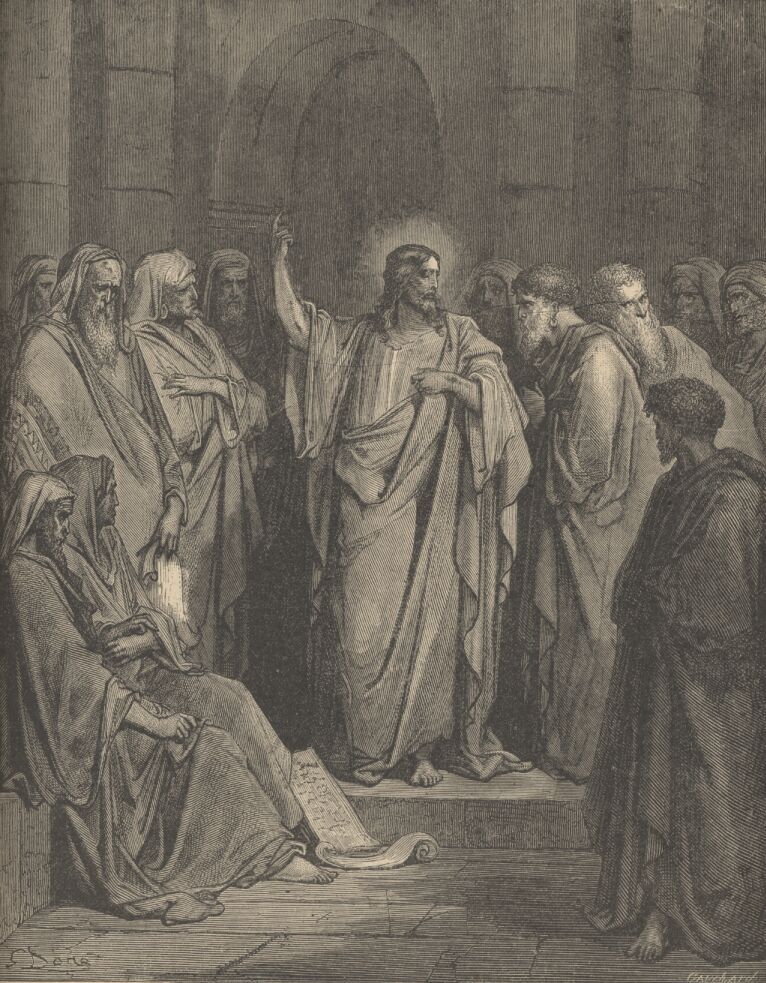
And it came to pass, that when Jesus had finished these parables, he departed thence. And when he was come into his own country, he taught them in their synagogue, insomuch that they were astonished, and said, Whence hath this man this wisdom, and these mighty works? Is not this the carpenter's son? is not his mother called Mary? and his brethren James, and Joses, and Simon, and Judas? And his sisters, are they not all with us? Whence then hath this man all these things?
And they were offended in him. But Jesus said unto them, A prophet is not without honor, save in his own country, and in his own house.
And he did not many mighty works there because of their unbelief.—Matthew xiii, 53-58.
THE DISCIPLES PLUCKING CORN ON THE SABBATH.
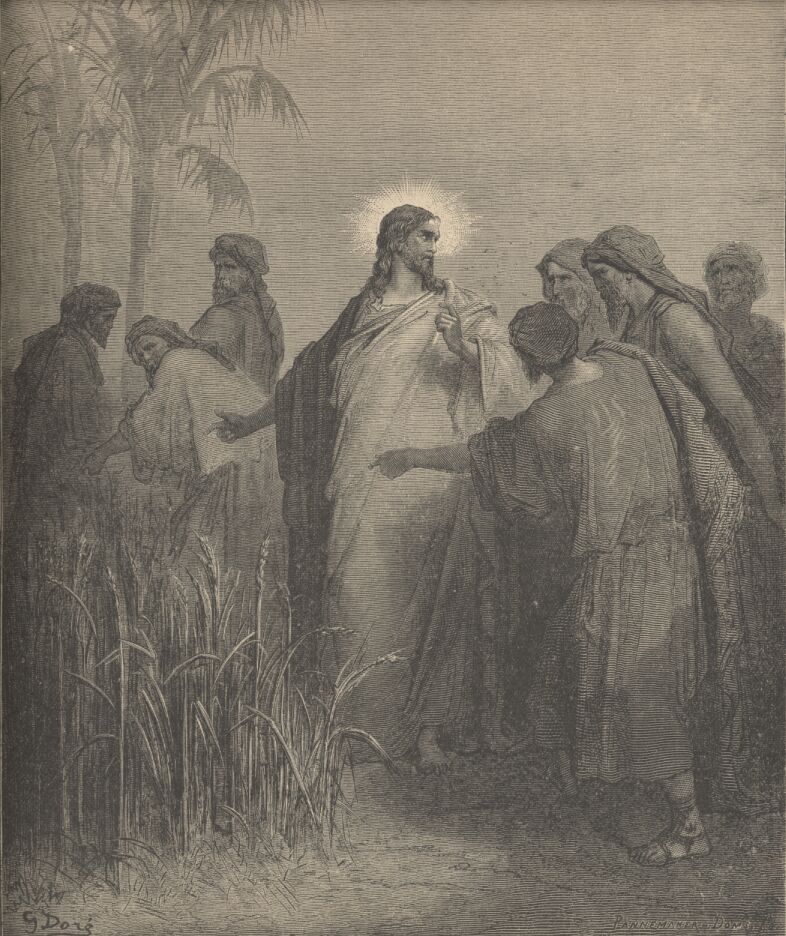
And it came to pass, that he went through the corn fields on the sabbath day; and his disciples began, as they went, to pluck the ears of corn.
And the Pharisees said unto him, Behold, why do they on the sabbath day that which is not lawful?
And he said unto them, Have ye never read what David did, when he had need, and was an hungered, he, and they that were with him? How he went into the house of God in the days of Abiathar the high priest, and did eat the shewbread, which is not lawful to eat but for the priests, and gave also to them which were with him? And he said unto them, The sabbath was made for man, and not man for the sabbath: Therefore the Son of man is Lord also of the sabbath.—Mark ii, 23-28.
JESUS WALKING ON THE WATER.
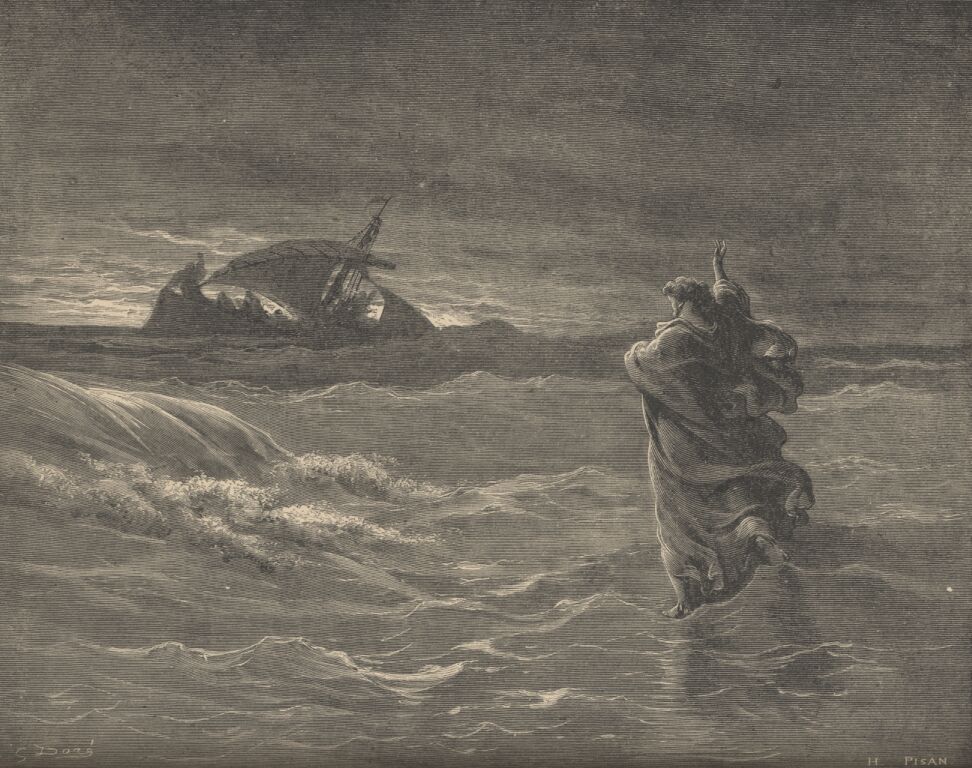
And when he had sent them away, he departed into a mountain to pray. And when, even was come, the ship was in the midst of the sea, and he alone on the land. And he saw them toiling in rowing; for the wind was contrary unto them: and about the fourths watch of the night he cometh unto them, walking upon the sea, and would have passed: by them. But when they saw him walking upon the sea, they supposed it had been a spirit, and cried out: for they all saw him, and were troubled. And immediately he talked with them, and saith unto them, Be of good cheer: it is I; be not afraid.
And he went up unto them into the ship; and the wind ceased: and they were sore amazed in themselves beyond measure, and wondered. For they considered not the miracle of the loaves; for their heart was hardened.—Mark vi, 46-52.
CHRIST'S ENTRY INTO JERUSALEM.
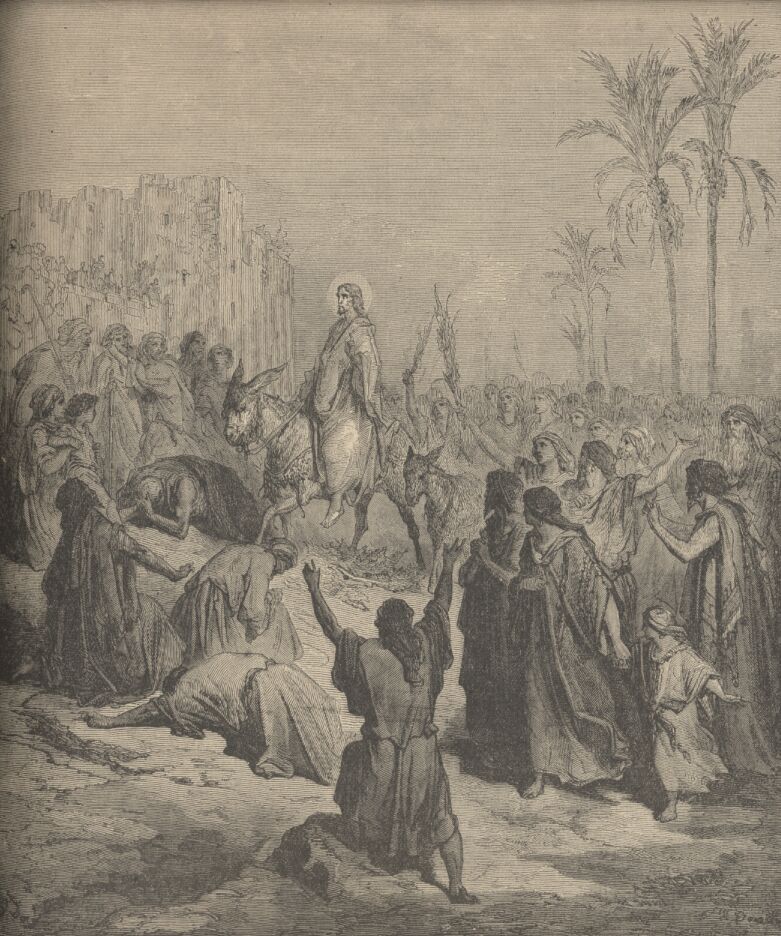
And when they drew nigh unto Jerusalem, and were come to Bethphage, unto the mount of Olives, then sent Jesus two disciples, saying unto them, Go into the village over against you, and straightway ye shall find an ass tied, and a colt with her: loose them, and bring the unto me. And if any man say ought unto you, ye shall say, The Lord hath need of them; and straightway he will send them.
All this was done that it might be fulfilled which was spoken by the prophet, saying, Tell ye the daughter of Sion, Behold, thy King cometh unto thee, meek, and sitting upon an ass'; and a colt the foal of an ass.
And the disciples went, and did as Jesus commanded them, and brought the ass, and the colt, and put on them their clothes, and they set him thereon.
And a very great multitude spread their garments in the way; others cut down branches; from the trees, and strewed them in the way. And the multitudes that went before, and that followed, cried, saying, Hosanna to the son of David: Blessed is he that cometh in the name of the Lord; Hosanna in the highest.
And when he was come into Jerusalem, all the city was moved, saying, Who is this? And the multitude said, This is Jesus the prophet of Nazareth of Galilee.—Matthew xxi, 1-11.
JESUS AND THE TRIBUTE MONEY.
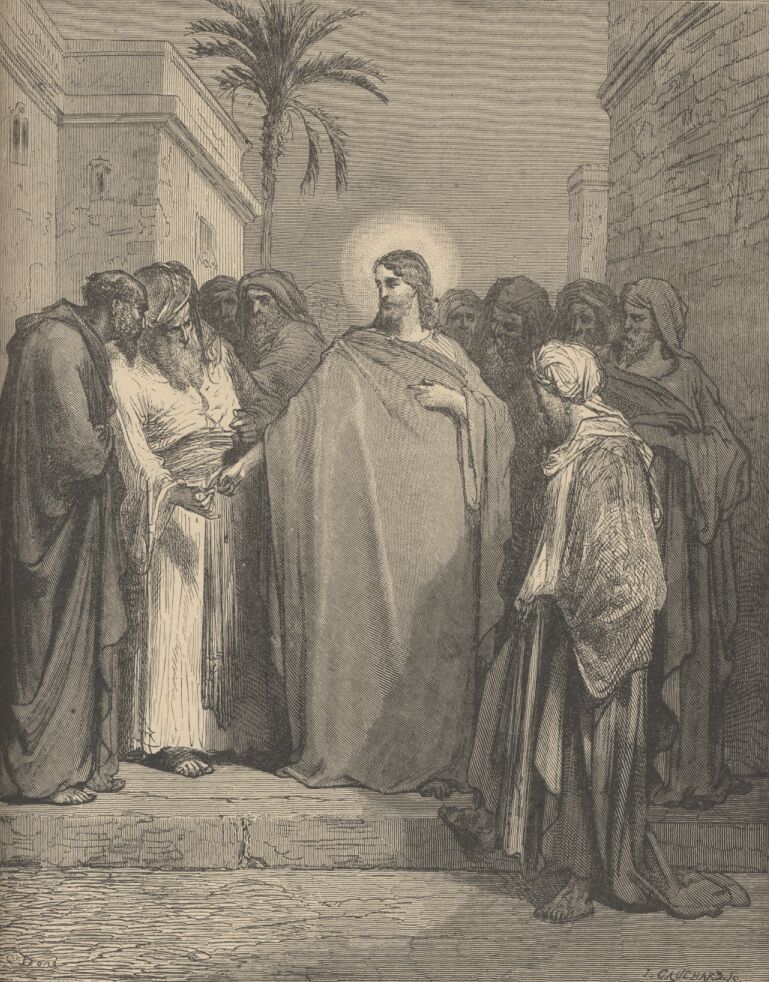
And they send unto him certain of the Pharisees and of the Herodians, to catch him in his words.
And when they were come, they say unto him, Master, we know that thou art true, and carest for no man: for thou regardest not the person of men, but teachest the way of God in truth: Is it lawful to give tribute to Caesar, or not? Shall we give, or shall we not give?
But he, knowing their hypocrisy, said unto them, Why tempt ye me? bring me a penny, that I may see it. And they brought it.
And he saith unto them, Whose is this image and superscription? And they said unto him, Caesar's.
And Jesus answering said unto them, Render to Caesar the things that are Caesar's, and to God the things that are God's.
And they marveled at him.—Mark xii, 13-17.
THE WIDOW'S MITE.
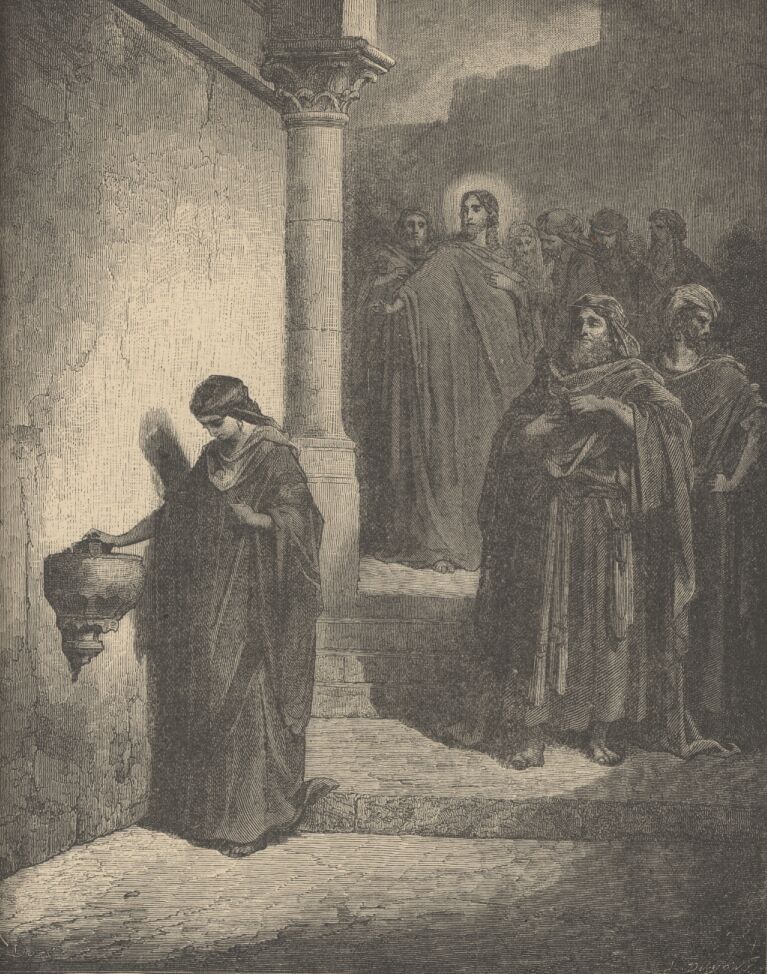
And Jesus sat over against the treasury, and beheld how the people cast money into the treasury: and many that were rich cast in much.
And there came a certain poor widow, and she threw in two mites, which make a farthing. And he called unto him his disciples, and saith unto them, Verily I say unto you, That this poor widow hath cast more in, than all they which have cast into the treasury: for all they did cast in of their abundance; but she of her want did cast in all that she had, even all her living.—Mark xii, 13-17
RAISING OF THE DAUGHTER OF JAIRUS.
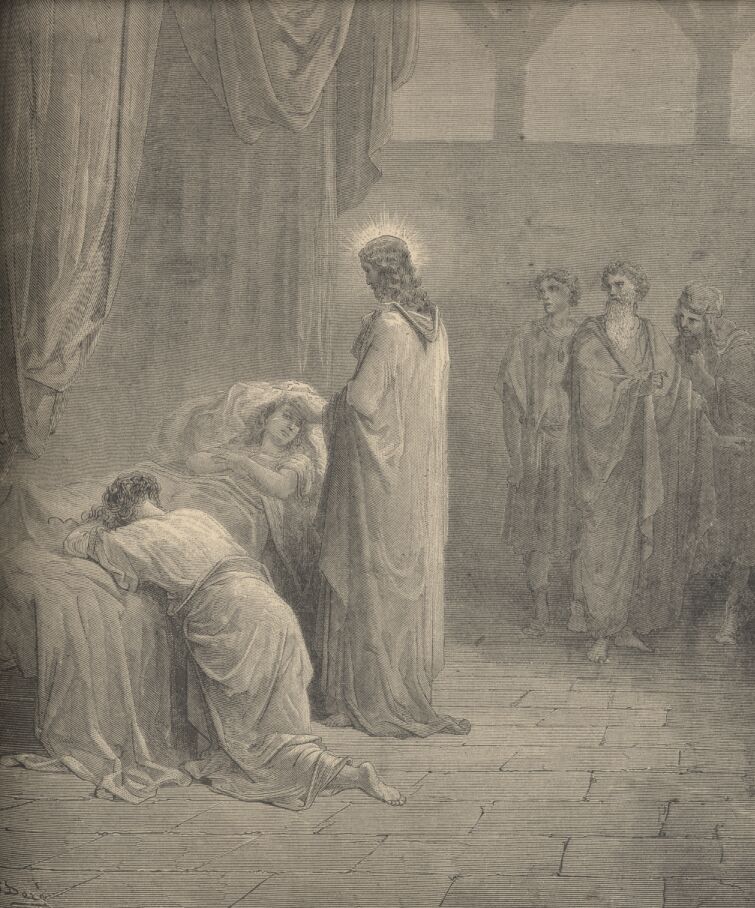
And, behold, there cometh one of the rulers of the synagogue, Jairus by name; and when he saw him, he fell at his feet, and besought him greatly, saying, My little daughter lieth at the point of death: I pray thee, come and lay thy hands on her, that she may be healed and she shall live. And Jesus went with him; and much people followed him, and thronged him.
And a certain woman which had an issue of blood twelve years, and had suffered many things of many physicians, and had spent all that she had, and was nothing bettered, but rather grew, worse, when she had heard of Jesus, came in the press behind, and touched his garment. For she said, If I may touch but his clothes, I shall be whole. And straightway the fountain of her blood was dried up; and she felt in her body that she was healed of that plague. And Jesus, immediately knowing in himself that virtue had gone out of him, turned him about in the press, and said, Who touched my clothes? And his disciples said unto him, Thou seest the multitude thronging thee, and sayest thou, Who touched me? And he looked round about to see her that had done this thing. But the woman fearing and trembling, knowing what was done in her, came and fell down before him, and told him all the truth. And he said unto her Daughter, thy faith hath made the whole; go in peace, and be whole of thy plague.
While he yet spake, there came from the ruler of the synagogue's house certain which said, Thy daughter is dead: why troublest thou the Master any further? As soon as Jesus heard the word that was spoken, he saith unto the ruler of the synagogue, Be not afraid, only believe. And he suffered no man to follow him, save Peter, and James, and John the brother of James. And he cometh to the house of the ruler of the synagogue, and seeth the tumult, and them that wept and wailed greatly. And when he was come in, he saith unto them, Why make ye this ado, and weep? the damsel is not dead, but sleepeth. And they laughed him to scorn. But when he had put them all out, he taketh the father and the mother of the damsel, and them that were with him, and entereth in where the damsel was lying. And he took the damsel by the hand, and said unto her, Talitha cumi; which is, being interpreted, Damsel, I say unto thee, arise. And straightway the damsel arose, and walked; for she was of the age of twelve years. And they were astonished with a great astonishment.
And he charged them straitly that no man should know it; and commanded that something should be given her to eat.—Mark v, 22-43.
THE GOOD SAMARITAN.
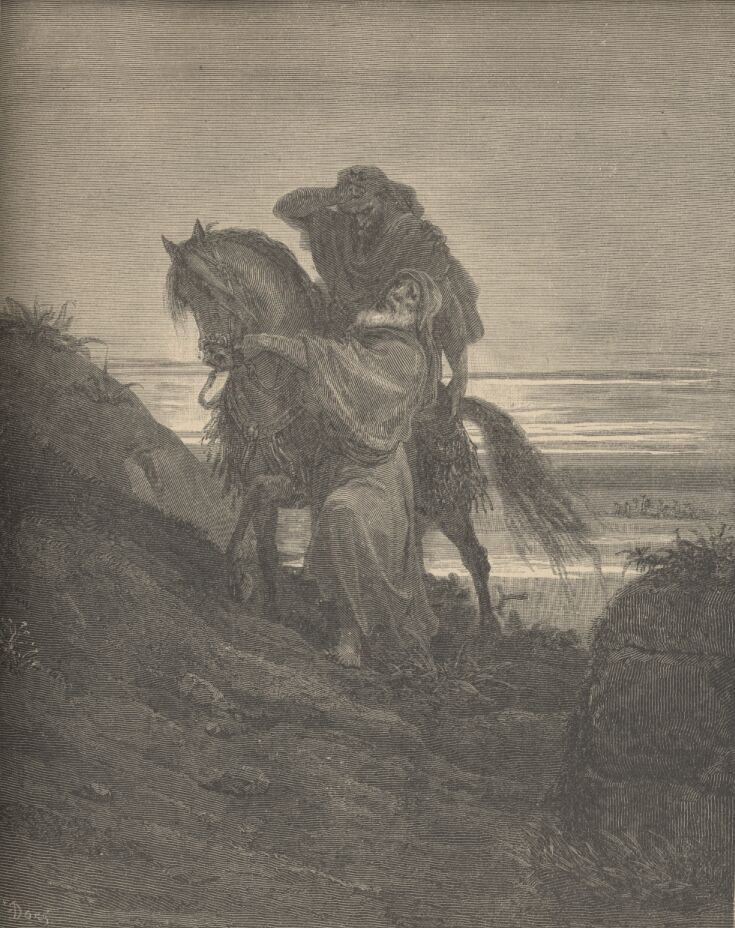
But he, willing to justify himself, said unto Jesus, And who is my neighbor?
And Jesus answering said, A certain man went down from Jerusalem to Jericho, and fell among thieves, which stripped him of his raiment, and wounded him, and departed, leaving him half dead. And by chance there came down a certain priest that way: and when he saw him, he passed by on the other side. And likewise a Levite, when he was at the place, came and looked on him, and passed by on the other side. But a certain Samaritan, as he journeyed, came where he was: and when he saw him, he had compassion on him. And went to him, and bound up his wounds, pouring in oil and wine, and set him on his own beast, and brought him to an inn, and took care of him. And on the morrow when he departed, he took out two pence, and gave them to the host, and said unto him, Take care of him; and whatsoever thou spendest more, when I come again, I will repay thee. Which now of these three, thinkest thou, was neighbor unto him that fell among the thieves?
And he said, He that shewed mercy on him.
Then said Jesus unto him, Go, and do thou likewise.—Luke x, 29-37.
ARRIVAL OF THE SAMARITAN AT THE INN.
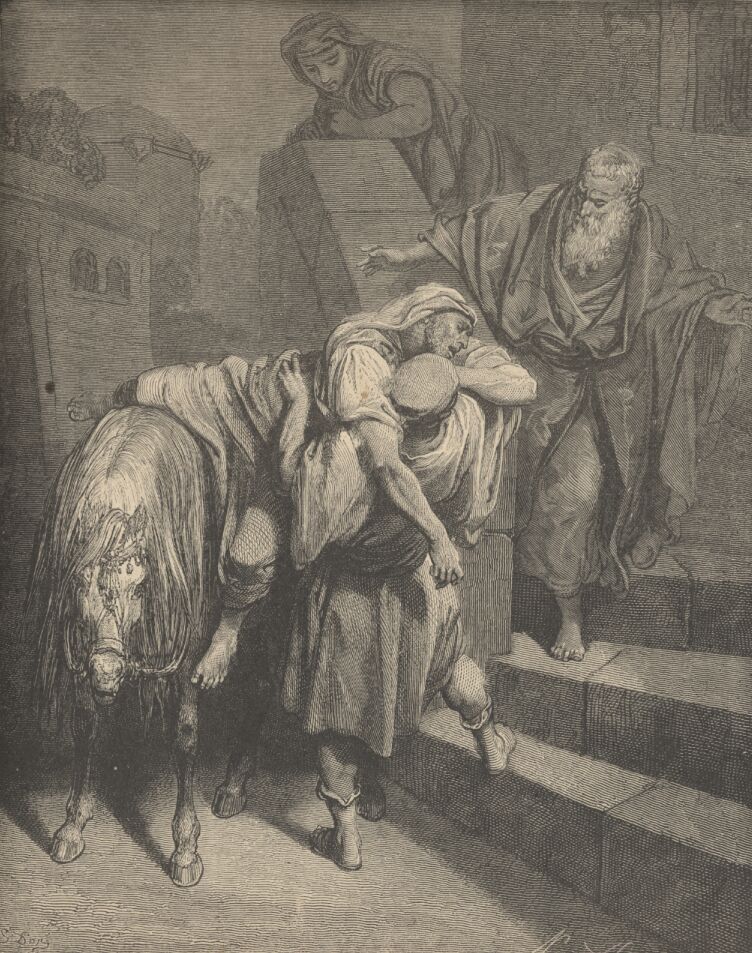
But a certain Samaritan, as he journeyed, came where he was; and when he saw him, he had compassion on him, and went to him, and bound up his wounds, pouring in oil and wine, and set him on his own beast, and brought him to an inn, and took care of him. Luke x, 33-34.
THE PRODIGAL SON.
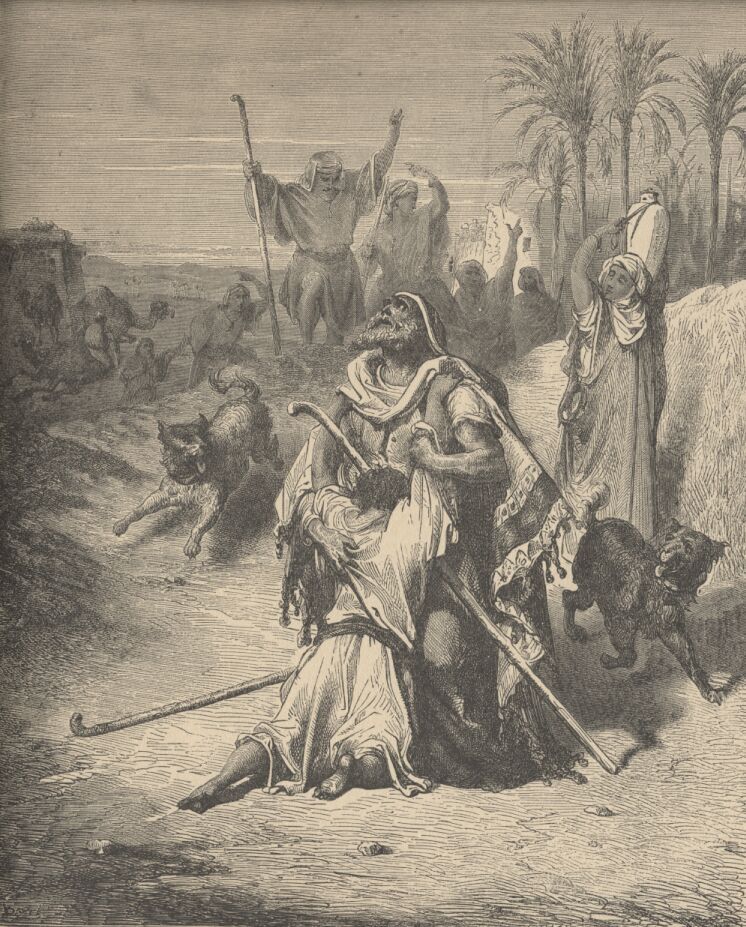
Likewise, I say unto you, there is joy in the presence of the angels of God over one sinner that repenteth.
And he said, a certain man had two sons: and the younger of them said to his father, Father, give me the portion of goods that falleth to me. And he divided unto them his living.
And not many days after the younger son gathered all together, and took his journey into a far country, and there wasted his substance with riotous living. And when he had spent all, there arose a mighty famine in that land; and he began to be in want. And he went and joined himself to a citizen of that country; and he sent him into his fields to feed swine. And he would fain have filled his belly with the husks that the swine did eat: and no man gave unto him.
And when he came to himself, he said, How many hired servants of my father's have bread enough and to spare, and I perish with hunger! I will arise and go to my father, and will say unto him, Father, I have sinned against heaven, and before thee, and am no more worthy to be called thy son: make me as one of thy hired servants.
And he arose, and came to his father. But when he was yet a great way off, his father saw him, and had compassion, and ran, and fell on his neck, and kissed him. And the son said unto him, Father, I have sinned against heaven, and in thy sight, and am no more worthy to be called thy son. But the father said to his servants, Bring forth the best robe, and put it on him; and put a ring on his hand, and shoes on his feet: And bring hither the fatted calf, and kill it; and let us eat, and be merry: for this my son was dead, and is alive again; he was lost, and is found. And they began to be merry.
Now his elder son was in the field: and as he came and drew nigh to the house, he heard music and dancing. And he called one of the servants, and asked what these things meant.
And he said unto him, thy brother is come; and thy father hath killed the fatted calf, because he hath received him safe and sound.
And he was angry, and would not go in: therefore came his father out, and intreated him. And he answering said to his father, Lo, these many years do I serve thee, neither transgressed I at any time thy commandment: and yet thou never gavest me a kid, that I might make merry with my friends: but as soon as this thy son was come, which hath devoured thy living with harlots, thou hast killed for him the fatted calf.
And he said unto him, Son, thou art ever with me, and all that I have is thine. It was meet that we should make merry, and be glad: for this thy brother was dead, and is alive again; and was lost, and is found.—Luke xv, 10-32.
LAZARUS AND THE RICH MAN.
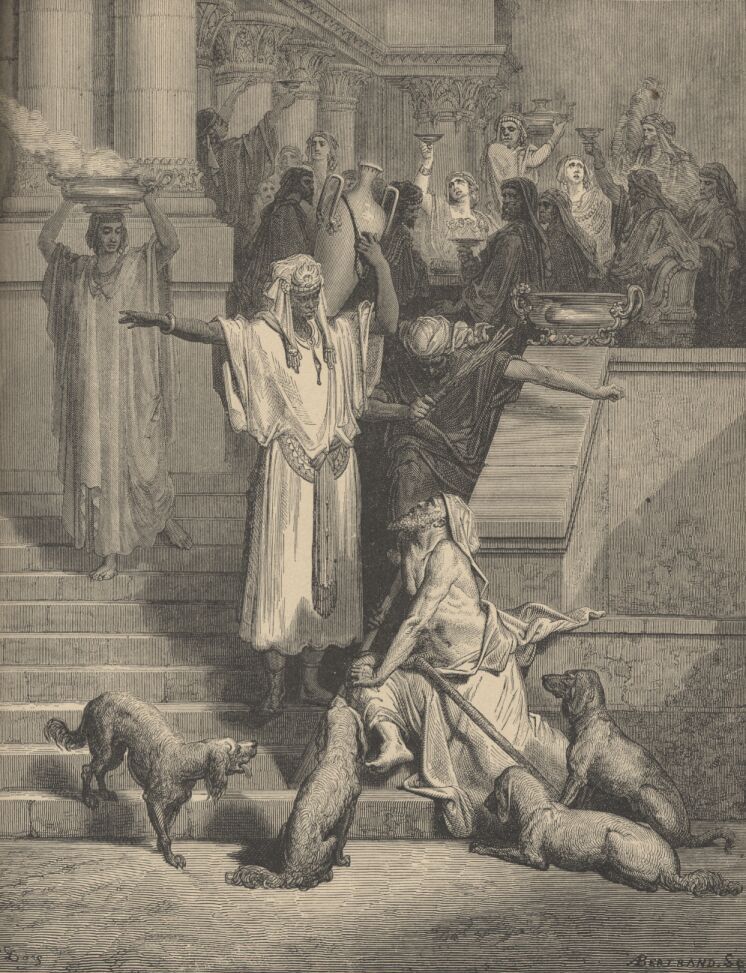
There was a certain rich man, which was clothed in purple and fine linen, and fared sumptuously every day:
And there was a certain beggar named Lazarus, which was laid at his gate, full of sores, and desiring to be fed with the crumbs which fell from the rich man's table: moreover the dogs came and licked his sores.
And it came to pass, that the beggar died, and was carried by the angels into Abraham's bosom: the rich man also died, and was buried; and in hell he lifted up his eyes, being in torments, and seeth Abraham afar off, and Lazarus in his bosom. And he cried and said, Father Abraham, have mercy on me, and send Lazarus, that he may dip the tip of his finger in water and cool my tongue; for I am tormented in this flame.
But Abraham said, Son, remember that thou in thy lifetime receivedst thy good things, and likewise Lazarus evil things: but now he is comforted, and thou art tormented. And beside all this, between us and you there is a great gulf fixed: so that they which would pass from hence to you cannot; neither can they pass to us, that would come from thence.
Then he said, I pray thee therefore, father, that thou wouldest send him to my father's house: for I have five brethren; that he may testify unto them, lest they also come into this place of torment.
Abraham saith unto him, They have Moses and the prophets; let them hear them.
And he said, Nay, father Abraham: but if one went unto them from the dead, they will repent.
And he said unto him, If they hear not Moses and the prophets, neither will they be persuaded though one rose from the dead.—Luke xvi, 19-31.
THE PHARISEE AND THE PUBLICAN.
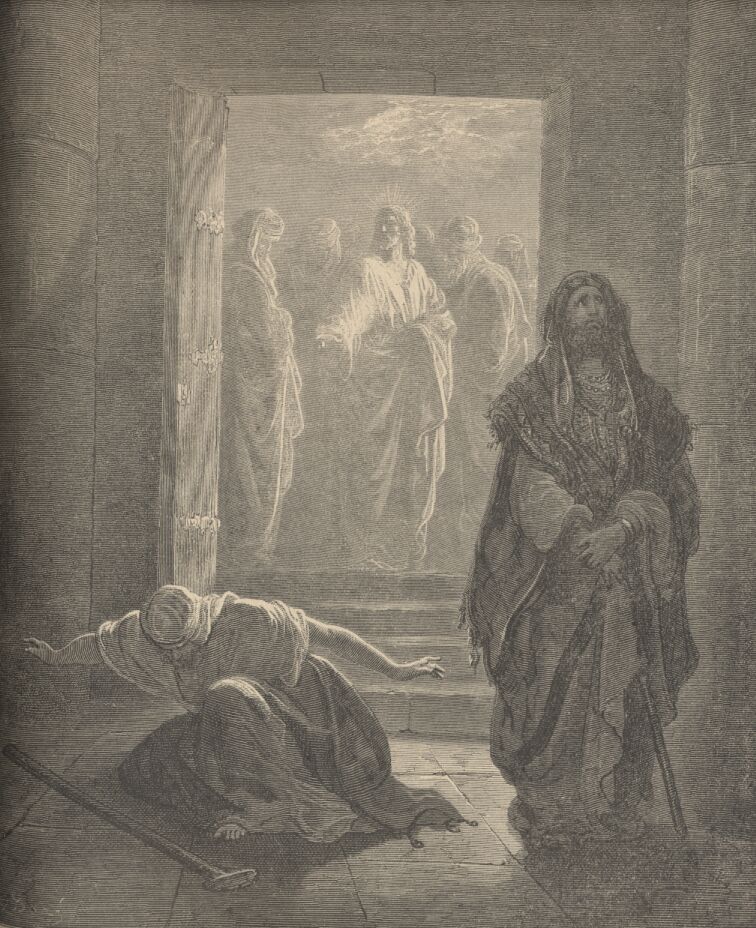
And he spake this parable unto certain which trusted in themselves that they were righteous, and despised others.
Two men went up into the temple to pray; the one a Pharisee, and the other a publican; The Pharisee stood and prayed thus with himself, God, I thank thee, that I am not as other men are, extortioners, unjust, adulterers, or even as this publican. I fast twice in the week, I give tithes of all that I possess. And the publican, standing afar off, would not lift up as much as his eyes unto heaven, but smote upon his breast, saying, God be merciful to me a sinner. I tell you, this man went down to his house justified rather than the other: for every: one that exalteth himself shall be abased; and he that humbleth himself shall be exalted. Luke xviii, 9-14.
JESUS AND THE WOMAN OF SAMARIA.
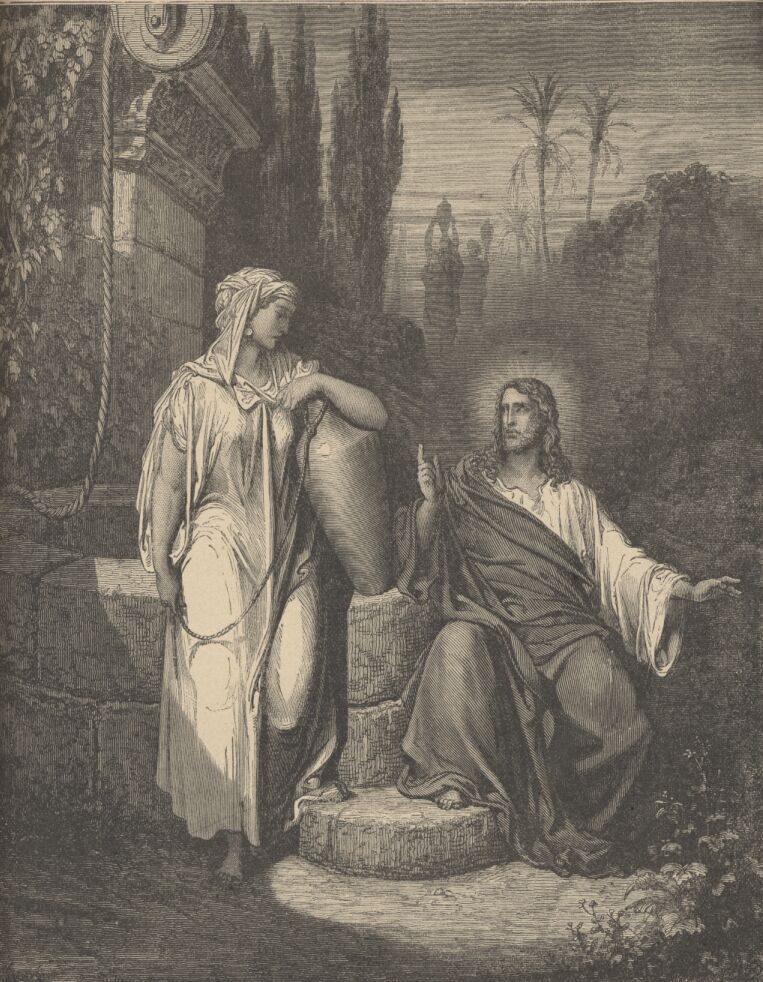
Then cometh he to a city of Samaria, which is called Sychar, near to the parcel of ground that Jacob gave to his son Joseph. Now Jacob's well was there. Jesus therefore, being wearied with his journey, sat thus on the well: and it was about the sixth hour. There cometh a woman of Samaria to draw water: Jesus saith unto her, Give me to drink.
(For his disciples were gone away unto the city to buy meat.)
Then saith the woman of Samaria unto him, How is it that thou, being a Jew, askest drink of me, which am a woman of Samaria? for the Jews have no dealings with the Samaritans.
Jesus answered and said unto her, If thou knewest the gift of God, and who it is that saith to thee, Give me to drink; thou wouldest have asked of him, and he would have given thee living water.
The woman saith unto him, Sir, thou hast nothing to draw with, and the well is deep from whence then hast thou that living water? Art thou greater than our father Jacob, which gave us the well, and drank thereof himself, and his children, and his cattle?
Jesus answered and said unto her, Whosoever drinketh of this water shall thirst again but whosoever drinketh of the water that I shall give him shall never thirst; but the water that I shall give him shall be in him a well of water springing up into everlasting life.
The woman saith unto him, Sir, give me this water, that I thirst not, neither come hither to draw.
Jesus saith unto her, Go, call thy husband, and come hither. The woman answered and said, I have no husband.
Jesus said unto her, Thou hast well said, I have no husband: for thou hast had five husbands; and he whom thou now hast is not thy husband: in that saidst thou truly.
The woman saith unto him, Sir, I perceive that thou art a prophet. Our fathers worshiped in this mountain; and ye say, that in Jerusalem is the place where men ought to worship.
Jesus saith unto her, Woman, believe me, the hour cometh, when ye shall neither in this mountain, nor yet at Jerusalem, worship the Father. Ye worship ye know not what: we know what we worship; for salvation is of the Jews. But the hour cometh, and now is, when the true worshipers shall worship the Father in spirit and in truth: for the Father seeketh such to worship him. God is a Spirit: and they that worship him must worship him in spirit and in truth.
The woman saith unto him, I know that Messias cometh, which is called Christ: when he is come, he will tell us all things.
Jesus saith unto her, I that speak unto thee am he.
And upon this came his disciples, and marveled that he talked with the woman: yet no man said, What seekest thou? or, Why talkest thou with her?
The woman then left her waterpot, and went her way into the city, and saith to the men, Come, see a man, which told me all things, that ever I did: is not this the Christ? Then they went out of the city, and came unto him.—John iv, 5-30.
JESUS AND THE WOMAN TAKEN IN ADULTERY.
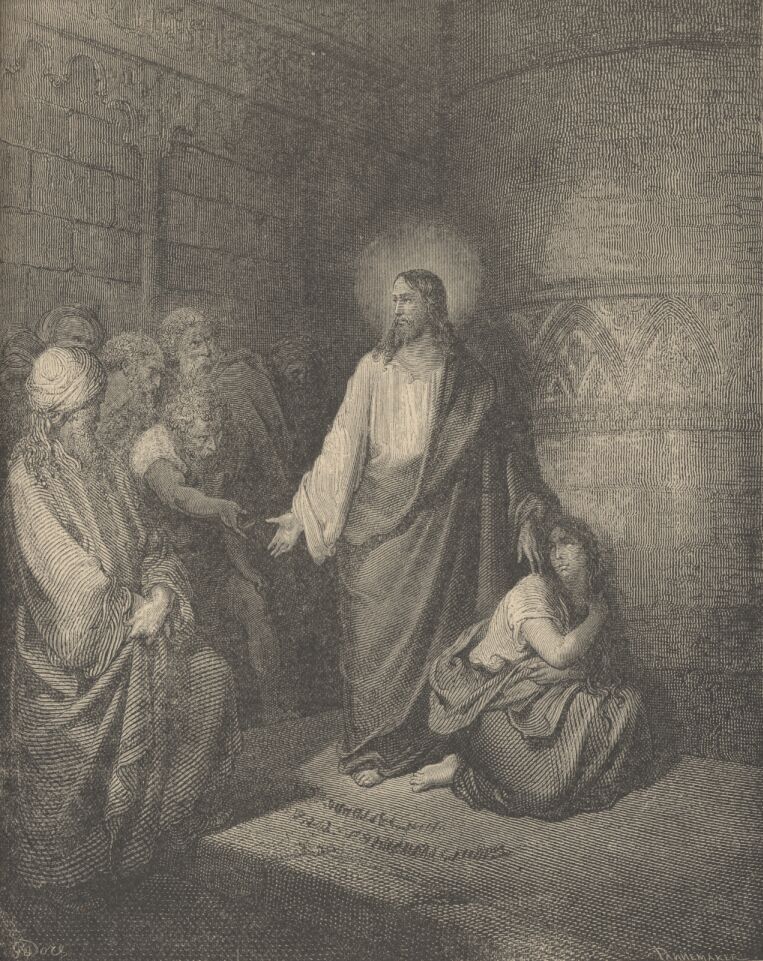
Jesus went unto the mount of Olives. And early in the morning he came again into the temple, and all the people came unto him; and he sat down, and taught them.
And the scribes and Pharisees brought unto him a woman taken in adultery; and when they had set her in the midst, they say unto him, Master, this woman was taken in adultery, in the very act. Now Moses in the law commanded us, that such should be stoned: but what sayest thou? This they said, tempting him, that they might have to accuse him.
But Jesus stooped down, and with his finger wrote on the ground, as though he heard them not.
So when they continued asking him, he lifted up himself, and said unto them, He that is without sin among you, let him first cast a stone at her.
And again he stooped down, and wrote on the ground.
And they which heard it, being convicted by their own conscience, went out one by one, beginning at the eldest, even unto the last; and Jesus was left alone, and the woman standing in the midst. When Jesus had lifted up himself, and saw none but the woman, he said unto her, Woman where are those thine accusers? Hath no man condemned thee? She said, No man, Lord.
And Jesus said unto her, Neither do I condemn thee: go, and sin no more. —John viii, 1-11.
THE RESURRECTION OF LAZARUS.
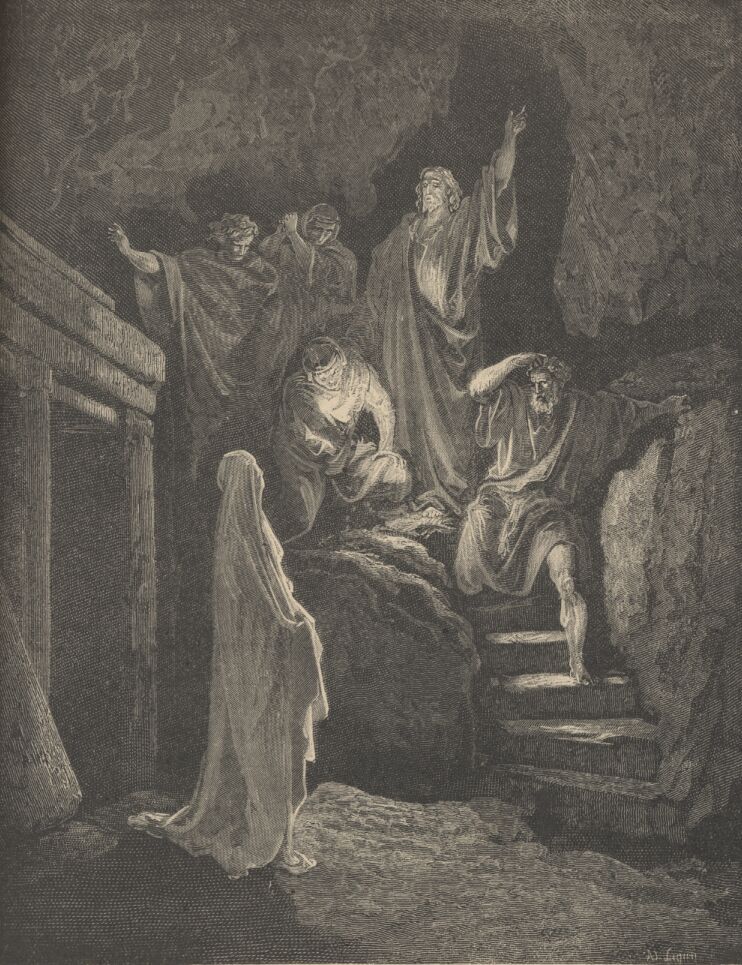
Now Jesus was not yet come into the town, but was in that place where Martha met him. The Jews then which were with her in the house, and comforted her, when they saw Mary, that she rose up hastily and went out, followed her, saying, She goeth unto the grave to weep there. Then when Mary was come where Jesus was, and saw him, she fell down at his feet, saying unto him, Lord, if thou hadst been here, my brother had not died.
When Jesus therefore saw her weeping, and the Jews also weeping which came with her, he groaned in the spirit, and was troubled, and said, Where have ye laid him?
They said unto him, Lord, come and see.
Jesus wept.
Then said the Jews, Behold how he loved him! And some of them said, Could not this man, which opened the eyes of the blind, have caused that even this man should not have died?
Jesus therefore again groaning in himself cometh to the grave. It was a cave and a stone lay upon it. Jesus said, Take ye away the stone.
Martha, the sister of him that was dead, saith unto him, Lord, by this time he stinketh for he hath been dead four days.
Jesus saith unto her, Said I not unto thee, that, if thou wouldest believe, thou shouldest see the glory of God?
Then they took away the stone from the place where the dead was laid.
And Jesus lifted up his eyes, and said, Father, I thank thee that thou hast heard me. And I knew that thou hearest me always: but because of the people which stand by I said it, that they may believe that thou hast sent me.
And when he thus had spoken, he cried with a loud voice, Lazarus, come forth.
And he that was dead came forth, bound hand and foot with graveclothes: and his face was bound about with a napkin.
Jesus saith unto them, Loose him, and let him go.
Then many of the Jews which came to Mary, and had seen the things which Jesus did, believed on him.—John xi, 30-45.
MARY MAGDALENE.
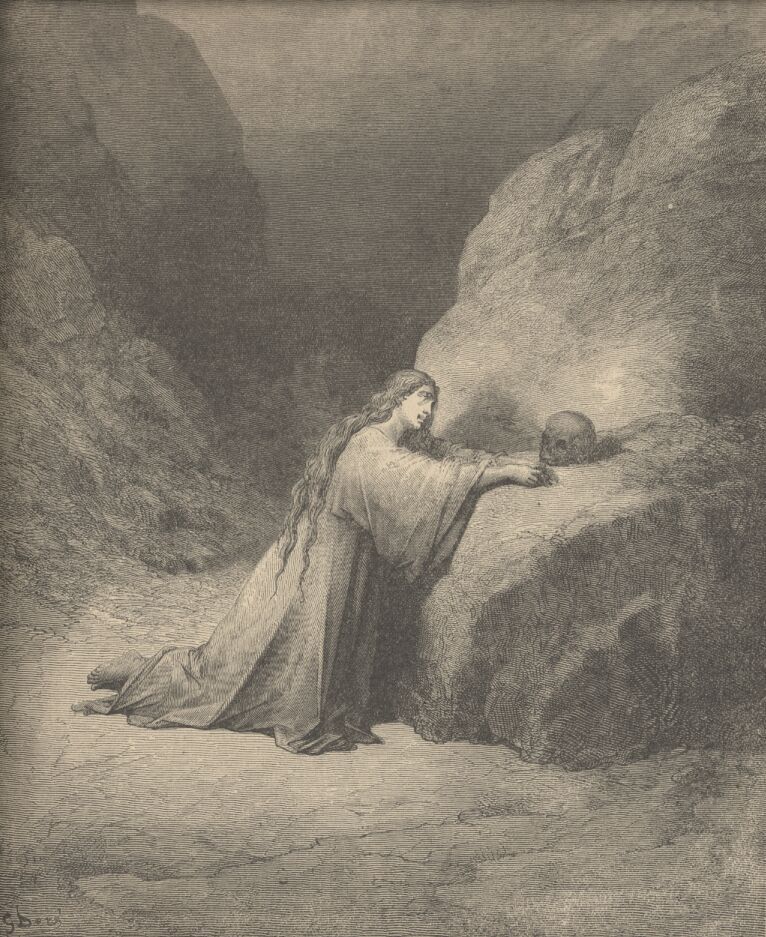
Of Mary "called Magdalene" (Luke viii, 2) but few particulars are recorded in scripture. We first hear of her as having been delivered by Jesus of seven devils (Luke viii, 1-3; Mark xvi, 9). Impelled, no doubt, by gratitude for her deliverance, she becomes one of his followers, accompanying him thenceforward in all his wanderings faithfully till his death. She was the first person to whom he appeared after his resurrection (Mark xvi, 9; John xx, 1, 11-18) The common belief that she was a fallen woman is destitute of the slightest foundation. On the contrary, the references to her as being in the company of such women as Joanna, the wife of Herod's steward, Salome, the mother of James and John, and Mary, the mother of Jesus (Luke viii, 3; Mark xvi, 40; John xix, 25), strongly discountenance such a supposition. The error, which had no other source than ecclesiastical tradition, has been fostered and perpetuated by the stupid blunder of the translators of the authorized version in identifying her with the "sinner" who is described in Luke vii, 37-50 as washing the feet of Jesus with her tears (see head-note to Luke vii).
The Roman Catholic notion that this "sinner" was Mary the sister of Lazarus is almost equally groundless (see Douay Bible, head-note to Matthew xxvi, and the foot-note references to Luke vii, 37, found in most Catholic Bibles). The only reason for this identification is that the anointing by the "sinner" is described as taking place in the house of a Pharisee named Simon (Luke vii, 36, 39-40, 43-44); that the anointing by the unnamed woman, as described in Matthew xxvi, 6-13 and Mark xiv, 3-9, took place in the house of one "Simon the leper," in Bethany; and that Mary, the sister of Lazarus, is described in John xi, 2, and John xii, 3-8, as anointing Jesus in a house (apparently that of Lazarus himself) in Bethany, when a conversation ensues altogether different from that recorded in Luke vii, but similar to that related in Matthew xxvi, and Mark xiv, save that the objection to the anointing of Jesus is made, not by "his disciples" (Matthew xxvi, 8), not by "some that had indignation" (Mark xiv, 4), but by "one of his disciples, Judas Iscariot, Simon's son" (John xii, 4). The demeanor of Mary, the sister of Lazarus, is, however, by no means that of a fallen and sinful though penitent woman but that of a pious and good one (see Luke x, 39, 42; John xi, 28-33; xii, 3).
Dore's illustration, which portrays Mary Magdalene as a heartbroken and despairing sinner, shows that he has fallen into the common error.
THE LAST SUPPER.
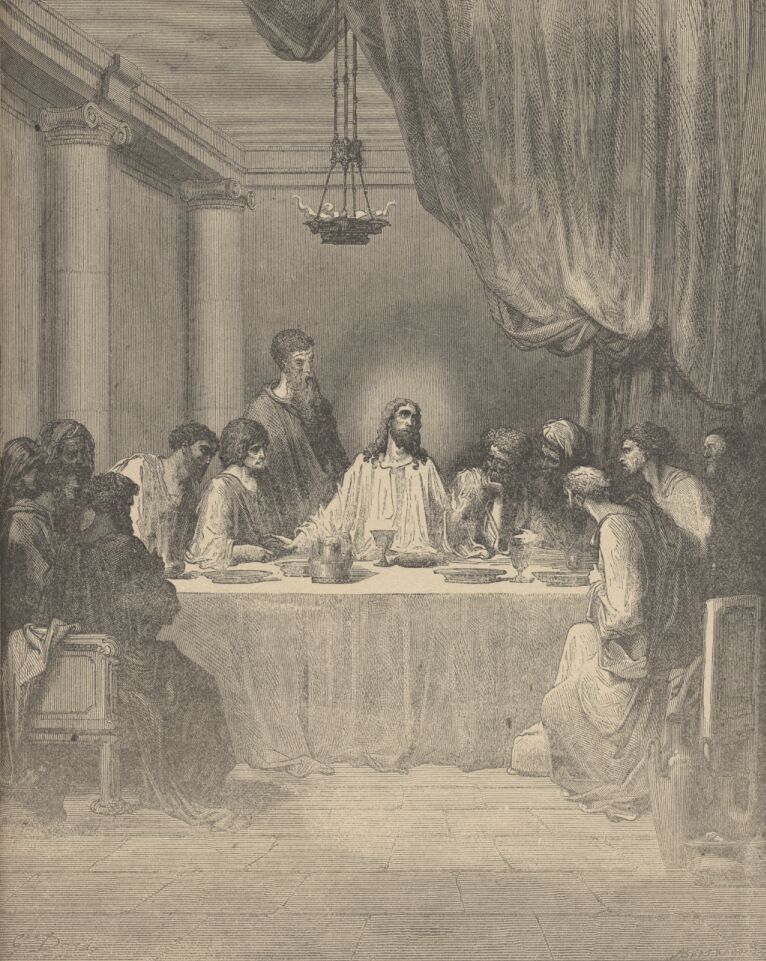
Now the first day of the feast of unleavened bread the disciples came to Jesus, saying unto him, Where wilt thou that we prepare for thee to eat the passover? And he said, Go into the city to such a man, and say unto him, The Master saith, My time is at hand; I will keep the passover at thy house with my disciples. And the disciples did as Jesus had appointed them; and they made ready the passover.
Now when the even was come, he sat down with the twelve. And as they did eat, he said, Verily I say unto you, that one of you shall betray me.
And they were exceeding sorrowful, and began every one of them to say unto him, Lord, is it I?
And he answered and said, He that dippeth his hand with me in the dish, the same shall betray me. The Son of man goeth as it is written of him: but woe unto that man by whom the Son of man is betrayed! it had been good for that man if he had not been born. Then Judas, which betrayed him, answered and said, Master, is it I? He said unto him, Thou hast said.
And as they were eating, Jesus took bread, and blessed it, and brake it, and gave it to the disciples, and said, Take, eat; this is my body. And he took the cup, and gave thanks, and gave it to them, saying, Drink ye all of it; for this is my blood of the new testament, which is shed for many for the remission of sins. But I say unto you, I will not drink henceforth of this fruit of the vine, until that day when I drink it new with you in my Father's kingdom.
And when they had sung an hymn, they went out into the mount of Olives.—Matthew xxvi, 17-30.
THE AGONY IN THE GARDEN.
| « Prev | DORE BIBLE GALLERY, COMPLETE | Next » |